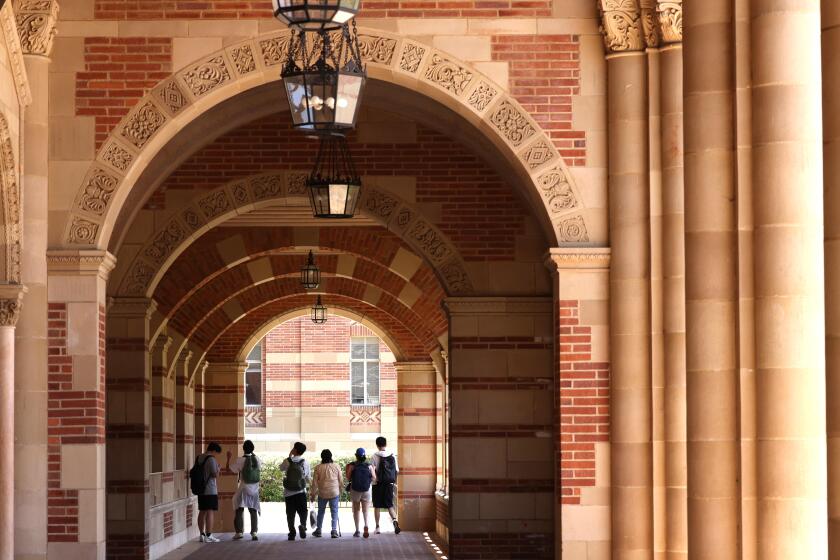A federal judge on Tuesday ordered the Trump administration to restore hundreds of suspended UCLA science research grants, affecting more than a third of the $584 million in funds the government abruptly froze late last month.
In her evening order, issued hours after a San Francisco court hearing, U.S. District Judge Rita F. Lin said the government’s slashing of UCLA funds violated her June ruling blocking science research grant terminations.
The National Science Foundation’s “suspension of the grants at issue here is vacated,” wrote Lin, of the Northern District of California. She ordered the Trump administration to file an update by Aug. 19 detailing whether it had restored the grants or, if not, “an explanation of why it was not feasible and a description of the steps that have been taken thus far.”
The case — independently filed by a group of UC professors — is the first legal test of whether massive grant suspensions at UCLA will pass court muster.
The Trump administration froze $584 million in science, medical and other federal grants, citing the university’s alleged discrimination in admissions and failure to “promote a research environment free of antisemitism.”
The UCLA freezes cover research funded by the NSF, the National Institutes of Health and the Department of Energy. They include studies into areas such as cancer, neurobiology and clean energy.
Spokespeople for the NSF, UC and UCLA did not immediately reply to requests for comment late Tuesday.
Case predates major UCLA grant freezes in July
The order issued Tuesday is related only to NSF grants, which make up about 300 of those frozen at UCLA. Hundreds of other suspended grants from the NIH and Energy Department are not affected.
The court challenge did not come in a case filed by the University of California, which has not sued over the cuts. Instead, it came in a 2-month-old class-action lawsuit filed by researchers at UC San Francisco and UC Berkeley.
At question during the Tuesday hearing was whether cuts to NSF grants were illegal under Lin’s June court order that blocked science funding terminations to many UC researchers throughout the nine-campus system.
UC professors funded by the NSF, Environmental Protection Agency and National Endowment for the Humanities had sued, arguing they faced cuts because their grants appeared in federal keyword searches related to race amid President Trump’s push to rid the government of diversity, equity and inclusion programs.
They also argued their funding was removed through the use of generic form letters with no explanation. They argued federal law requires that government officials cite the reasons why money already approved through a competitive applications process was taken away.
Lin said she was inclined to agree with researcher arguments while the case proceeded. She issued a preliminary injunction June 23.
What happened at Tuesday’s hearing
On Tuesday, Lin challenged Trump administration lawyers to explain why the new sciencecuts at UCLA did not violate her earlier court order.
“Two weeks ago, NSF went out and, again, used form letters to cut off findings to researchers at UCLA en masse,” Lin said. She asked Justice Department lawyers what set apart the most recent cuts from previous ones she enjoined.
Government lawyers said the newest UCLA cuts were different for two reasons. First, they said, the funding freezes were “suspensions,” not “terminations,” which were the subject of Lin’s earlier ruling.
“If it is a suspension, then it is not covered under the court’s injunction,” said Justice Department lawyer Jason Altabet.
Another Justice Department lawyer, Michael Velchik, argued that the grants had been cut so recently that they could not be viewed as “terminations.”
“A week is certainly not enough time for this court to adjudicate that a suspension of one week is de facto a termination,” Velchik said.
In her Tuesday order, Lin disagreed.
“NSF’s indefinite suspensions differ from a termination in name only,” she wrote.
Lin later added: “For avoidance of doubt, the court also clarifies that grant ‘termination,’ as the term is used in the preliminary Injunction, encompasses circumstances where grant funding is cut off on a long-term or indefinite basis, like the suspensions carried out by NSF on July 30” at UCLA.
The government lawyers also said the Trump administration did not freeze all grants to UCLA but spared some that were “critical” and “important.”
They did not elaborate on which or how many grants those were. This answer came in response to Lin’s questions about whether the government was indiscriminately cutting grants — an issue that led her to block terminations in June.
Representing UC researchers was UC Berkeley law school Dean Erwin Chemerinsky.
Chemerinsky said that the UCLA cuts amounted to “exactly the kind of en masse terminations that the court enjoined previously.”
For researchers, he said, the terms “suspension” and “termination” are the same.
“They can no longer pay rent, no longer pay graduate students, no longer pay postdocs. There is no difference,” Chemerinsky said.
The Berkeley professor accused the government of “holding hostage all the individual grants to try to coerce UCLA into a settlement.”
Velchik disagreed.
“There are legitimate and bona fide concerns that the government has with the conduct that has taken place at UCLA,” he said, saying the university has had “gross and horrific” antisemitism and also mentioning allegations of “racial preferences” at the UCLA medical school.
The Trump administration has demanded more than $1 billion from the University of California to restore the more than half a billion dollars in UCLA funds. The government is also asking UCLA to agree to sweeping campus changes over protest rules, gender identity, admissions-data sharing and other areas.
UC leaders say that they are willing to negotiate but that the current terms are “unacceptable.” Gov. Gavin Newsom has called the Trump demands an attempt at “extortion” and “ransom,” saying he wants to sue.
The UC Board of Regents, which held an emergency meeting at UCLA on Monday, has not announced a suit.
This story originally appeared in Los Angeles Times.

